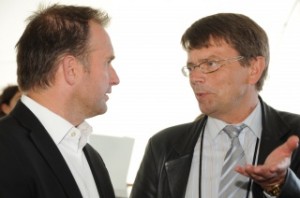‘Clustering’ to become a global ‘brain economy’

David McConnell, chair of ATEED (left) chats to Prof Torger Reve
By Kevin Kevany
Could this be ‘the dawning of the Age of Competitiveness’ for New Zealand? The omens are good at year-end 2011, with all of the right signals suddenly lighting up and a passionate advocate of the need for a country to be both competitive and ‘attractive’ to succeed in the rapidly maturing global world trips through Auckland.
That’s Prof Torger Reve, a leading thinker and doer, when it comes to his homeland Norway. He sees interesting parallels between his country and our own which made for a stimulating discussion after his presentation to the 14th Annual Global Conference of The Competitiveness Institute (TCI) held in early December, under the aegis of ATEED (Auckland Tourism, Events and Economic Development).
Prof Reve is one of approximately 3,000 leading practitioners ‘action people’ focused on the role of competitiveness, ‘clusters’ and innovation, belonging to that ‘knowledge platform’, who challenged New Zealanders to get with the global plan. The world has moved on from whingeing about manufacturing moving to the East, or our North. He’s predicting it could go to the Middle East next.
Oil-rich Norway, encouraged by the likes of Reve, isn’t resting on its petroleum treasures and has already ‘clustered’ itself around existing – and dating – strengths to enjoy the lowest unemployment rate in the world and the highest GDP per capita. They also have the highest labour costs in the world. So they clearly know what competitiveness is all about. No debates about lifting the minimum wage there.
And they are prepared to share with a country that has many similarities, or as Reve notes, one that is also: small, beautiful, blessed with resources, and remote.
Given there are currently signs that the RWC win on sheer guts and competitiveness has lifted us, are we poised to get up and go? Already the Ministry of Science and Innovation and NZ Trade and Enterprise, both now heavily focused on being business-oriented, are housed in the same building in Wellington are moving into shared premises on Auckland’s Waterfront.
Across town the NZ Institute and the Business Roundtable plan to provide a united voice and leadership by the end of the first quarter.
On top of this, the new Cabinet will see action-man Steven Joyce head-up the Ministry of Economic Development, the Ministry of Science and Innovation, NZ Trade and Enterprise and continue to have responsibility for tertiary education. It’s not quite the Ministry for Manufacturing, but it’s positive movement.
Reve would approve of Joyce combining tertiary education. Norway sets the very highest store in top-rate education, as well as tailoring it to meet the changing industrial needs of the country.
“We need to realise that China is not content to merely stay where it is; it is becoming more-and-more a knowledge-based economy. No country can afford to let its education system stand still.”
He points to Norway’s School of Anchor Handling as an example of what his country has done to ensure excellence in what they are ‘clustered’ – or specialise — around: Maritime engineering and finance; food (the dominant salmon farmers in the world); and offshore oil and gas; still their major earner.
He asks why New Zealand doesn’t have a school specialising in dairy farming, producing the best dairy farmers in the world? The Kiwi attendees shift uncomfortably in their chairs muttering: do we really have to go that far?
That far, and further, would be Reve’s response. To be competitive you have to be the best there is. Which is why the world’s petroleum industry comes to Norway to build and finance its oil rigs. Houston is only a back-up now.
“We had a great ship-building industry, but began to realise that all ships would be built in the East. We had a great fishing fleet. But fishing stocks became erratic, and we realised it would be better to farm fish and be a reliable and sustainable marketer.
“But we adapted those ship-building and maritime skills to making, manning and funding oil platforms.”
If you want an example of specialising, the professor recommends the city in China which produces six-billion pairs of socks a year.
Reve confirms the thinking of our own Sir Paul Callaghan that biotech is not for either country. “Boston owns that. They have cornered its research and development and therefore the major biotech corporations have moved there.
“Nevertheless, Norway is focussing on biotechnology in the processing of food, since it will benefit production in one of our key areas of specialising.”
To read more contact words@xtra.co.nz



